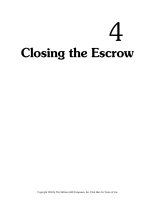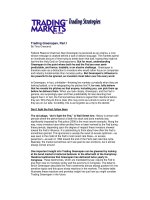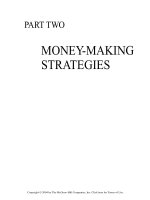Home Closing Checklist Part 3
Bạn đang xem bản rút gọn của tài liệu. Xem và tải ngay bản đầy đủ của tài liệu tại đây (305.3 KB, 22 trang )
3
Obtaining the
Financing to
Close the Deal
10460_Irwin_08_f.qxd 7/24/03 2:24 PM Page 115
Copyright 2004 by The McGraw-Hill Companies, Inc. Click Here for Terms of Use.
This page intentionally left blank.
QUESTIONS TO ASK YOURSELF
Why do I need a lender to close?
□
Unless you’re paying cash for your property, you will
need a mortgage to close your deal. This mortgage will be
the difference between what you’re putting down in cash
and the balance of the price. If you’re buying a home for
$100,000 and putting $10,000 down, you’ll need a mort-
gage for $90,000. Of course, you’ll also need to have the
cash to pay for closing costs (or finance those costs).
Have I specified the mortgage I need?
□
Your purchase agreement should detail the mortgage
including:
• Full amount of mortgage
• Maximum interest rate you’ll pay
• Term (10 years, 15 years, 30 years, or other
terms)
• Type (fixed interest rate, variable rate, hybrid)
• Maximum points you’ll pay
It’s important that this all be spelled out and that it be
written in the form of a contingency. Thus, your purchase
agreement would state that your purchase of the property
was “subject to” your getting the specified mortgage.
This way if for some reason you could not get the mort-
8
Finding a Good Lender
117
10460_Irwin_08_f.qxd 7/24/03 2:24 PM Page 117
Copyright 2004 by The McGraw-Hill Companies, Inc. Click Here for Terms of Use.
gage, you would not be obligated to continue with the
purchase and should, presumably, be able to get your
deposit back.
Have I found a lender?
□
Because getting financing is such an integral part of pur-
chasing a home today, you should find a lender long
before you even begin to look at property. Lining up a
lender will allow you to be preapproved (see below),
which has two big advantages. First, by submitting a
credit report, detailing your assets including cash on
hand, and describing your income, the lender can tell you
how big a property you can afford. Thus, you’ll know
your price range. Second, the lender can give you a letter
of preapproval that will help convince a wary seller that
you can, indeed, afford the property your are bidding on.
Today, almost every buyer comes in with some sort of
preapproval letter.
Am I preapproved?
□
This means that a lender has examined your qualifica-
tions to get a loan and based on that, has determined the
amount of a mortgage you can qualify for (usually given
as a maximum monthly payment). Today, a good preap-
proval letter will specify the following:
• The monthly payment you can afford to make on
a mortgage. This is important because as interest
rates go down, your monthly payment will
allow you to obtain a bigger mortgage. Unfortu-
nately, as rates rise, the mortgage you can afford
will decrease.
• The level of your preapproval:
• Highest. The lender has verified your income,
assets, and credit and is ready to fund.
• Middle. The lender has verified your credit
and, assuming your assets and income are as
you state, will fund.
• Lowest. The lender’s representative (usually a
mortgage broker—see below) has taken a ver-
bal application from you and based on that,
118
CHAPTER EIGHT
10460_Irwin_08_f.qxd 7/24/03 2:24 PM Page 118
has issued the letter. No funding will occur
unless and until the lender approves your
credit, assets, and income.
• The term of the letter—usually a month or two.
You can use this preapproval letter to convince a seller
to agree to your purchase offer. Of course, the higher the
level of preapproval, the better chance you have. After you
succeed in getting a seller to sign a purchase agreement,
you can go back to the lender and seek funding of the loan,
something that can take anywhere from a few days up to
45 days, depending on what problems occur. You are not
usually obligated to go back to the lender who gave you a
preapproval. However, if you unwisely paid a fee for this
normally free service or contractually agreed to go with the
original lender, you may feel obliged to.
Have I checked out different lenders?
□
All money is the same. Lenders, however, are different.
Some are simply businesspeople out to make a buck and
in so doing, provide a valuable service to you. Afew can
be predatory. You need to beware of the latter. While they
often advertise lower-than-market interest rates, after
you add in points and garbage fees (see Chapters 1 and
2), their true costs can be significantly higher. Arecom-
mendation from a friend, associate, relative, or other per-
son not affiliated with the particular lending company is often
a good reference. Areal estate agent may also be able to
recommend a good lender. Be wary, however, of agents
who may recommend a lender with whom they have a
financial arrangement. (See “controlled business arrange-
ments” in Chapter 3.) Also, demand to see all costs up
front before even applying for a mortgage.
Have I checked out a mortgage broker?
□
Amortgage broker is to a loan what a real estate broker is
to property. Indeed, most mortgage brokers also hold real
estate agent licenses, although they may hold an addi-
tional license for lending. Mortgage brokers “contract”
with a wide variety of lenders. They become the retail
outlet for those lenders. For example, a bank in Vermont
FINDING A GOOD LENDER
119
10460_Irwin_08_f.qxd 7/24/03 2:24 PM Page 119
may want to make a mortgage in California. It has no
offices in California, so it makes arrangements with a
mortgage broker to secure loans for it. For this the Ver-
mont bank pays the mortgage broker a fee, typically 1 to
1.5 percent of the loan amount. Of course, it could be a
bank in the same state as the mortgage broker, or even a
consortium of investors (such as insurance companies)
who have pooled their money and intend to make real
estate loans. The mortgage broker then goes out and
secures mortgages from people like you. He or she takes
the application and forwards it to the lender who
arranges for underwriting, if necessary. The mortgage
broker also arranges for an appraisal of the house, gets
the credit report, and secures all of the paperwork neces-
sary to obtain the loan, and ultimately sees that the docu-
ments you need to sign are delivered to the escrow
holder. This is how he or she earns the fee.
Have I avoided paying a broker’s fee?
□
As noted above, the lender pays the mortgage broker’s
fee directly. That does not mean, however, that some
mortgage brokers will not attempt to charge you an addi-
tional fee. Usually there is nothing illegal about this.
Unfortunately, as of this writing, they usually do not have
to disclose the fee they are earning directly from the
lender (this should change in the near future), and some
unscrupulous brokers have demanded an additional fee
from borrowers sometimes claiming that this is their only
source of income. If you pay the mortgage broker, chances
are he or she is getting paid twice. When looking for a
mortgage broker, the first thing you should ask is if he or
she is charging you a fee. The only acceptable fees up
front for the buyer to pay are for an appraisal (between
$200 and $350) and a credit report (usually under $50).
Most good mortgage brokers will absorb the credit report
fee if you go ahead and get the financing through them.
Have I checked out a mortgage banker?
□
Note that mortgage brokers (above) do not lend you their
own money. Rather, they act as brokers for the actual
lenders. On the other hand, some lenders make direct
loans. Think of a mortgage banker as a bank that has no
120
CHAPTER EIGHT
10460_Irwin_08_f.qxd 7/24/03 2:24 PM Page 120
checking or savings accounts, no commercial accounts,
and usually no retail offices. Its sole business is to make
mortgage loans, which it funds from its own capital. (It
then usually packages the loans in groups and resells
them on the secondary market to Fannie Mae or Freddie
Mac.) Most mortgage bankers are simply another lender
for mortgage brokers to use. When you apply for a mort-
gage from your mortgage broker, he or she may be get-
ting it from a mortgage banker. However, in some areas of
the country, mortgage bankers go directly to the public.
Thus, you might avoid a mortgage broker and get a loan
directly from a mortgage banker. Keep in mind that this
will not usually save you money. The mortgage banker
will not normally share with you the fee it would other-
wise pay a mortgage broker. There is no harm, and prob-
ably no advantage, in dealing directly with a mortgage
banker.
Have I searched for a good mortgage lender?
□
As noted above, try to get a recommendation from a per-
son you know is not affiliated with the lender you are con-
sidering. You can also try the Yellow Pages in the phone
book. Look under banks and mortgage brokers. And try the
Internet. Many mortgage brokerage companies operate
exclusively through their Web sites such as eloan.com or
mortgage.com, which means that you can even get a loan
online.
Have I tried getting an online mortgage?
□
It can be faster, but sometimes it is more difficult. If all of
the materials you need to qualify are readily available,
then the online lender can handle qualifying your loan in
a matter of hours. The usual materials you need to qual-
ify are an online credit report, online appraisal (yes, for
some homes these are available!), bank check for deposits
you have on hand, and online check with your employer.
On the other hand, if these are not available via the Web,
you will need to obtain them and spend a lot of time mail-
ing things in. Also, some escrow companies will not work
with online lenders, and this could lead to complications
with the seller and/or the agents involved in the deal.
FINDING A GOOD LENDER
121
10460_Irwin_08_f.qxd 7/24/03 2:24 PM Page 121
Have I tried a bank or credit union?
□
By all means, do! Sometimes banks run special real estate
financing deals. Try the big ones first (Bank of America,
Wells Fargo, Citibank, etc.), and then also try some local
banks in your area, the latter if you’ve got some special
problem that they are more likely to understand because
they live in your community. Credit unions may also
make some real estate loans, usually second mortgages.
Their big advantage is that the interest rate they charge
could be more competitive. However, sometimes the
hoops you must jump through and the garbage fees they
attach offset this.
Have I avoided paying an advance fee?
□
Your goal is to get money from the lender, not to give
money to it. Except for credit reports and appraisal fees,
most lenders will not charge you anything to secure financ-
ing through them. Beware of a mortgage broker or other
lender who wants money up front to secure a mortgage for
you. Once you pay the money (it could be $1000 or more),
you are locked into this lender. If you go elsewhere, you
may lose the money you paid. If this lender then wants to
charge you a higher-than-market interest rate or lots of
garbage fees, you are caught. Either you pay, or you lose
your advance fee. Sometimes unscrupulous lenders charge
advance fees when interest rates are dropping and there is
a surge of borrowers who are afraid they won’t be able to
find a lender. Don’t worry because, since time immemo-
rial, there have always been plenty of lenders.
Should I check out my own credit?
□
Yes, this is usually a good idea. You can apply for a credit
report on yourself from any one of the three national
credit reporting bureaus for a nominal fee (see the Inter-
net Resources at the end of this book). When you get your
credit report, check to be sure all the facts, such as your
name, address, social security number, and employment
information, are accurate. Also check to be sure that all of
the reports from lenders are accurate. For example, an old
lender may have overlooked sending a report that you
122
CHAPTER EIGHT
10460_Irwin_08_f.qxd 7/24/03 2:24 PM Page 122









